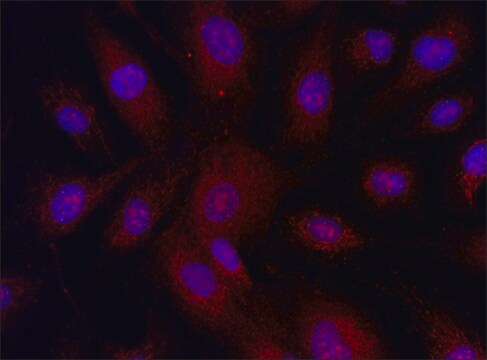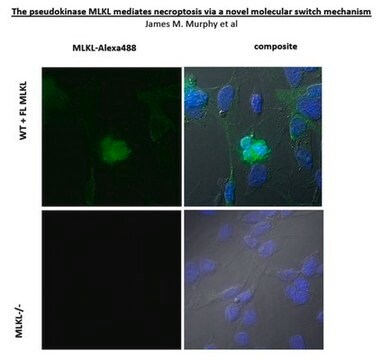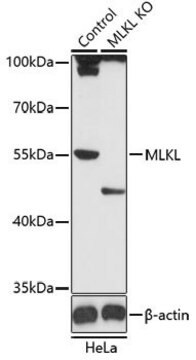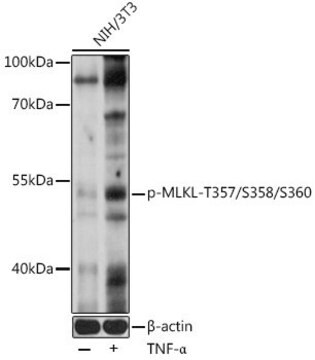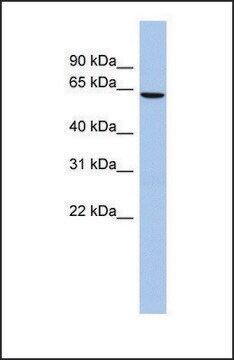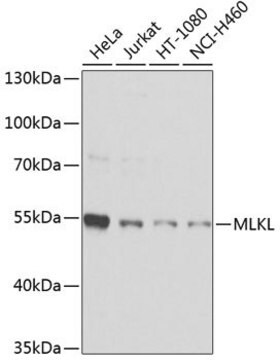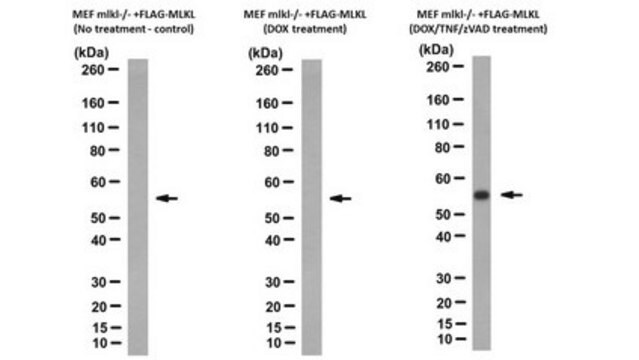SAB1408428
Anti-MLKL antibody produced in mouse
purified immunoglobulin, buffered aqueous solution
Sinonimo/i:
FLJ34389
Autenticatiper visualizzare i prezzi riservati alla tua organizzazione & contrattuali
About This Item
Codice UNSPSC:
12352203
NACRES:
NA.41
Prodotti consigliati
Origine biologica
mouse
Livello qualitativo
Coniugato
unconjugated
Forma dell’anticorpo
purified immunoglobulin
Tipo di anticorpo
primary antibodies
Clone
polyclonal
Stato
buffered aqueous solution
PM
antigen ~54.5 kDa
Reattività contro le specie
human
tecniche
indirect immunofluorescence: suitable
western blot: 1 μg/mL
N° accesso NCBI
N° accesso UniProt
Condizioni di spedizione
dry ice
Temperatura di conservazione
−20°C
modifica post-traduzionali bersaglio
unmodified
Informazioni sul gene
human ... MLKL(197259)
Categorie correlate
Descrizione generale
MLKL has a C-terminal pseudokinase (PsK) domain and an N-terminal 4-helix bundle (4HB) domain. Both these domains are held together by two brace helices.
The gene MLKL (mixed lineage kinase domain-like protein) is mapped to human chromosome 16q23. Activated MLKL is present at the cell membrane.
Immunogeno
MLKL (NP_689862.1, 1 a.a. ~ 471 a.a) full-length human protein.
Sequence
MENLKHIITLGQVIHKRCEEMKYCKKQCRRLGHRVLGLIKPLEMLQDQGKRSVPSEKLTTAMNRFKAALEEANGEIEKFSNRSNICRFLTASQDKILFKDVNRKLSDVWKELSLLLQVEQRMPVSPISQGASWAQEDQQDADEDRRAFQMLRRDNEKIEASLRRLEINMKEIKETLRQYLPPKCMQEIPQEQIKEIKKEQLSGSPWILLRENEVSTLYKGEYHRAPVAIKVFKKLQAGSIAIVRQTFNKEIKTMKKFESPNILRIFGICIDETVTPPQFSIVMEYCELGTLRELLDREKDLTLGKRMVLVLGAARGLYRLHHSEAPELHGKIRSSNFLVTQGYQVKLAGFELRKTQTSMSLGTTREKTDRVKSTAYLSPQELEDVFYQYDVKSEIYSFGIVLWEIATGDIPFQGCNSEKIRKLVAVKRQQEPLGEDCPSELREIIDECRAHDPSVRPSVDEILKKLSTFSK
Sequence
MENLKHIITLGQVIHKRCEEMKYCKKQCRRLGHRVLGLIKPLEMLQDQGKRSVPSEKLTTAMNRFKAALEEANGEIEKFSNRSNICRFLTASQDKILFKDVNRKLSDVWKELSLLLQVEQRMPVSPISQGASWAQEDQQDADEDRRAFQMLRRDNEKIEASLRRLEINMKEIKETLRQYLPPKCMQEIPQEQIKEIKKEQLSGSPWILLRENEVSTLYKGEYHRAPVAIKVFKKLQAGSIAIVRQTFNKEIKTMKKFESPNILRIFGICIDETVTPPQFSIVMEYCELGTLRELLDREKDLTLGKRMVLVLGAARGLYRLHHSEAPELHGKIRSSNFLVTQGYQVKLAGFELRKTQTSMSLGTTREKTDRVKSTAYLSPQELEDVFYQYDVKSEIYSFGIVLWEIATGDIPFQGCNSEKIRKLVAVKRQQEPLGEDCPSELREIIDECRAHDPSVRPSVDEILKKLSTFSK
Applicazioni
Anti-MLKL antibody produced in mouse has been used in western blotting.
Azioni biochim/fisiol
MLKL (mixed lineage kinase domain-like protein) primarily causes receptor-interacting protein (RIP) kinase–dependent necroptosis. However, during hepatitis, it results in programmed hepatocellular necrosis which is independent of RIPK3. MLKL also participates in endosomal trafficking and the formation of extracellular vesicle.
MLKL activation and subsequent N-terminal 4HB domain unleashing leads to oligomerization and cell membrane entry. This in turn leads to necroptosis.
Stato fisico
Solution in phosphate buffered saline, pH 7.4
Esclusione di responsabilità
Unless otherwise stated in our catalog or other company documentation accompanying the product(s), our products are intended for research use only and are not to be used for any other purpose, which includes but is not limited to, unauthorized commercial uses, in vitro diagnostic uses, ex vivo or in vivo therapeutic uses or any type of consumption or application to humans or animals.
Non trovi il prodotto giusto?
Prova il nostro Motore di ricerca dei prodotti.
Codice della classe di stoccaggio
10 - Combustible liquids
Classe di pericolosità dell'acqua (WGK)
WGK 1
Punto d’infiammabilità (°F)
Not applicable
Punto d’infiammabilità (°C)
Not applicable
Scegli una delle versioni più recenti:
Possiedi già questo prodotto?
I documenti relativi ai prodotti acquistati recentemente sono disponibili nell’Archivio dei documenti.
Depletion of RIPK3 or MLKL blocks TNF-driven necroptosis and switches towards a delayed RIPK1 kinase-dependent apoptosis.
Remijsen Q, et. al.
Cell Death & Disease, 5, e1004-e1004 (2014)
Understanding allosteric interactions in hMLKL protein that modulate necroptosis and its inhibition.
Nupur Bansal et al.
Scientific reports, 9(1), 16853-16853 (2019-11-16)
Mixed Lineage Kinase domain-Like (MLKL), a key player in necroptosis, is a multi-domain protein with an N-terminal 4 helical bundle (4HB) and a pseudokinase domain (PsK) connected by brace helices. Phosphorylation of PsK domain of MLKL is a key step
Kevin Puertas-Neyra et al.
Frontiers in neuroanatomy, 16, 812487-812487 (2022-03-01)
Retinal neurodegenerative diseases are the leading causes of visual impairment and irreversible blindness worldwide. Although the retinal response to injury remains closely similar between different retinal neurodegenerative diseases, available therapeutic alternatives are only palliative, too expensive, or very specific, such
Genetic changes associated with testicular cancer susceptibility.
Pyle LC and Nathanson KL
Seminars in Oncology, 43, 575-575 (2016)
The pseudokinase MLKL mediates programmed hepatocellular necrosis independently of RIPK3 during hepatitis.
Gunther C
The Journal of Clinical Investigation, 126, 4346-4346 (2016)
Global Trade Item Number
| SKU | GTIN |
|---|---|
| SAB1408428-50UG | 4061837222894 |
Il team dei nostri ricercatori vanta grande esperienza in tutte le aree della ricerca quali Life Science, scienza dei materiali, sintesi chimica, cromatografia, discipline analitiche, ecc..
Contatta l'Assistenza Tecnica.